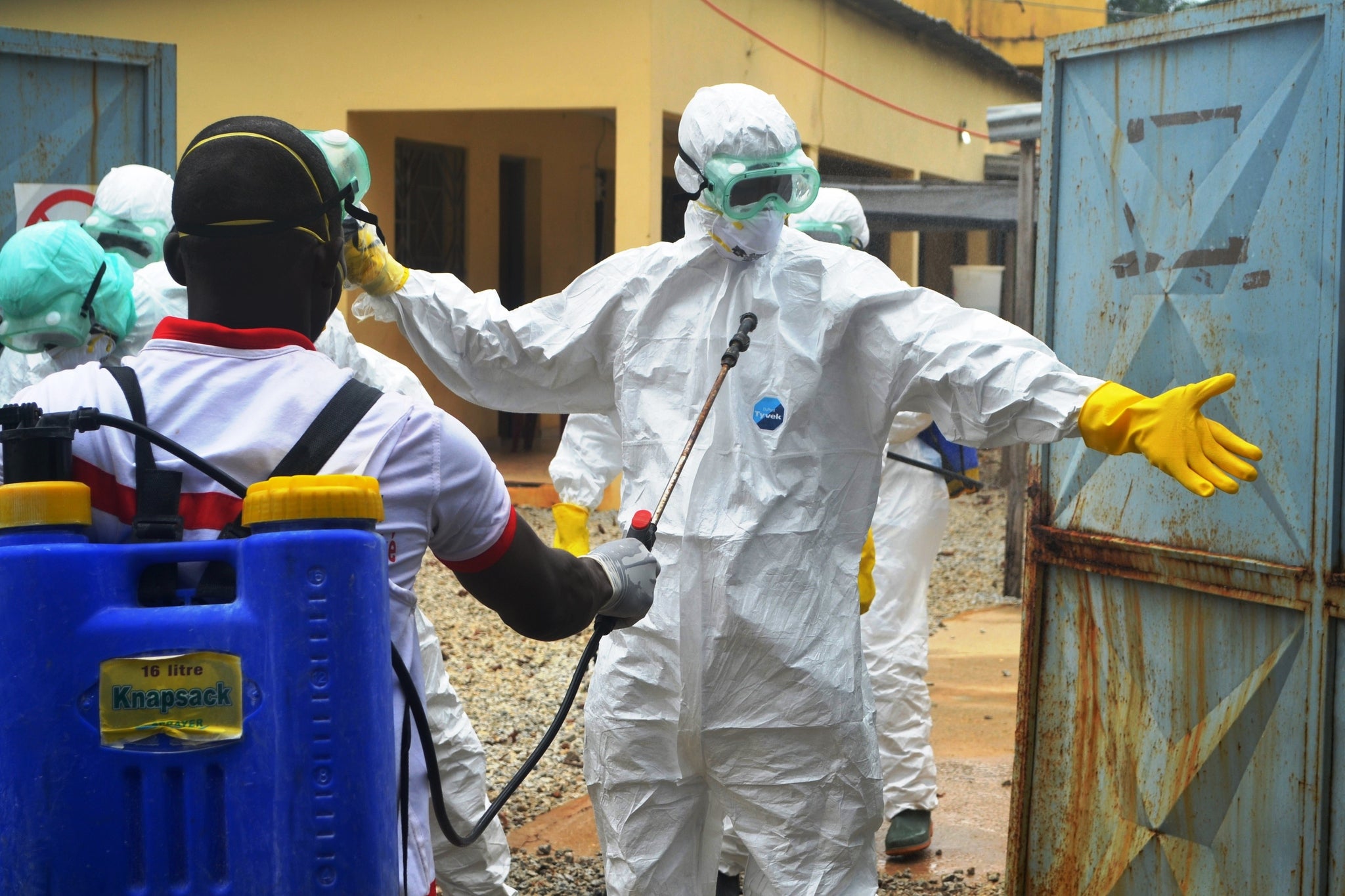Ebola in US: Disease is living in an American doctor's eye
Ian Crozier describes discovery as "like an assault"

Ebola first came to America with Thomas Eric Duncan, a Liberian man who died in Dallas on 8 October. Then, two nurses who treated Duncan were infected, but recovered — the only two cases of the virus contracted within the borders of the United States. While other Ebola cases have cropped up, they are typically brought to the Western hemisphere by health or humanitarian workers toiling in the African nations Ebola has hit hardest.
Yet, according to a recent report in the New England Journal of Medicine, Ebola is still on US shores — in the eye of a doctor who contracted the disease in Africa, but recovered. The study, “Persistence of Ebola Virus in Ocular Fluid during Convalescence,” highlights the toll Ebola takes on patients like Ian Crozier who survive, and points to what we still don’t know about the epidemic.
In September 2014, Crozier, 44, was a World Health Organization volunteer working in an Ebola treatment unit in Sierra Leone. He was diagnosed with the disease and, days later, transported to Emory University Hospital in Atlanta. Put on a ventilator and dialysis, he lost 30 pounds, and doctors said the virus had impacted his brain function and ability to walk. But, like most who made it home to the United States, he survived.
More than a month passed. Then, it seemed, Crozier was better. His blood and urine tested negative for the virus. His semen, however, tested positive, so he was told to abstain from sex or use condoms for a few months.
Soon, he started to notice other symptoms. He went back to the hospital with blurred vision as well as increased pressure and acute pain in his left eye. Perhaps strangest, his eye colour had changed from blue to green.
“It was like an assault,” he told the New York Times. “It was so personal.”
The cause: Ebola in the eye. Not only was Crozier’s sight at risk, but doctors who had treated him worried they had contracted and spread the virus. After all, Crozier was supposed to be cured; an eye doctor who drew fluid from Crozier’s eye had not worn protective gear. The opthamalogist put himself into a kind of mini-quarantine, limiting his contact with his family and sleeping in a guest room at home. Surfaces at test labs were disinfected.
No additional Ebola was found, but the fear was back.
“This case highlights an important complication of [Ebola virus disease] with major implications for both individual and public health that are immediately relevant to the ongoing West African outbreak,” Jay Varkey of Emory University Hospital and his colleagues wrote in the journal.
Crozier’s not alone. Ebola survivors in West Africa have reported lingering or new symptoms months later — headaches and chronic pain as well as eye issues.
In pictures: The village where Ebola started
Show all 5“We’re seeing symptoms in patients who’ve been out of the treatment unit for up to nine months,” John Fankhauser, the medical director of a hospital in Monrovia, told the New York Times. “They’re still very severe and impacting their life every day.”
Ebola may have found refuge in patients’ eyes because, researchers said, the eye is walled off from the immune system. As the New York Times put it: “The barriers are not fully understood, but they include tightly packed cells in minute blood vessels that keep out certain cells and molecules, along with unique biological properties that inhibit the immune system.” This phenomenon is called “immune privilege” — and it means the eye can harbor viruses.
Other immune privileged organs include the brain and testicles. Indeed, doctors knew semen could contain Ebola longer than the blood, but may be just now finding out how long the virus can survive in the body — and how it behaves after patients are “cured.”
In March, doctors diagnosed a woman in Liberia and identified only one plausible link to her exposure: unprotected sex with a male Ebola survivor, according to the Centers for Disease Control and Prevention. Previously, the CDC advised male survivors to avoid sex or use condoms for three months. Based on this new case, it now urges them to abstain from unprotected sex indefinitely. The agency has also posted a FAQ about whether pets can contract or transmit Ebola. And, in some circumstances, the disease may even become airborne, according to one study.
“There was almost a rush to ensure the public that we knew a lot more than we did,” Michael T. Osterholm, an epidemiologist at the Center for Infectious Disease Research and Policy at the University of Minnesota who wrote a New York Times op-ed about airborne transmission, told The Washington Post’s Lenny Bernstein last year. “But we’re saying you can’t rule out respiratory transmission.”
By most accounts, casual contact with Crozier and other Ebola survivors poses no health risk.
“I want to emphasize that as far as we know, the Ebola virus is not transmitted by casual contact,” the American Academy of Opthamology said in a statement. “The current study does not suggest that infection can be transmitted through contact with tears or the ocular surface of patients who have recovered from their initial infection.”
Since December 2013, the outbreak in West Africa has infected more than 26,000 people. More than 11,000 have died, the CDC said. But the good news: Liberia, the worst-affected country, plans to declare an end to the outbreak, as the Associated Press reported. And, although Crozier has not completely recovered, his vision is improving.
Copyright Washington Post
Subscribe to Independent Premium to bookmark this article
Want to bookmark your favourite articles and stories to read or reference later? Start your Independent Premium subscription today.

Join our commenting forum
Join thought-provoking conversations, follow other Independent readers and see their replies